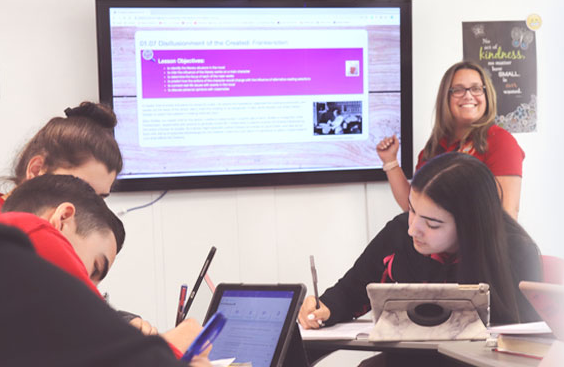
Archdiocese of Miami Virtual School, owned and operated by the Archdiocese of Miami, offers full- and part-time enrollment, introducing students to Catholic virtues and principles while enhancing learning for participants across the country.
When Florida Gov. Ron DeSantis signed HB 1 into law, he praised it as “the largest expansion of education choice not only in this state but in the history of these United States.” During committee hearings, lawmakers called it “transformational.”
The sweeping legislation extended eligibility for the Sunshine State’s 20-year-old school choice program to every student regardless of income. It also gave parents more control over their children’s education by converting traditional scholarships to education savings accounts.
The accounts, called ESAs, allow funds to be spent on pre-approved uses such as curriculum, digital materials, and tutoring programs in addition to private school tuition and fees.
But despite the greater opportunities for customization, one thing was not included: religious virtual schools. Under the new law, students may use funds to attend non-sectarian virtual schools, such as Florida Virtual School, and traditional in-person religious schools, but not a combination of the two.
That language means that schools such as Archdiocese of Miami Virtual Catholic School and Families of Faith Christian Academy International, which offers a private virtual school option, are excluded from participating in the state’s K-12 education choice scholarship programs. However, families who are using personalized education plans under HB 1 are allowed to use ESA funds to buy curriculum from ADOM Virtual Catholic School, even though they can't use the money to enroll at the school.
The Lakeland-based school is working on passing inspections for a campus on property owned by Epic Church, according to its website. Students who attend the in-person campus full time will be able to use scholarships. Before the pandemic, the school offered a blend of traditional and home-based instruction for homeschool families.
However, when Covid-19 made online education more popular, the school focused more on its virtual offerings.
Jim Lawson, the administrator at Families of Faith, hopes that closing the loophole will be on the lawmakers’ list when the 2024 session begins.
“With all the good that is included in HB 1, which we support, the Florida Legislature has continued to limit a wide range of high-quality educational options,” said Lawson, administrator for Families of Faith, who co-founded the school in 1994 with several other homeschool families.
“Parents can choose a high-quality campus-based program that aligns with the academic needs of their students while not conflicting with their faith. But they are not given the same choice to choose a high-quality accredited virtual program for a faith-based private school. The foundational principle of school choice is to have the same menu of options that families who choose the public school system, which includes FLVS, available to them from the private sector.”
Jim Rigg, superintendent of schools for the Archdiocese of Miami, which has a virtual Catholic school that offers full- and part-time programs, has a similar perspective.
“We favor efforts that maximize the ability of families to choose the school that best fits their child’s needs,” Rigg said. “This would include faith-based virtual schools, such as the ADOM Virtual School used by hundreds of students throughout Florida and across the world.”
Some say the language puts HB 1 in conflict with the First Amendment’s free exercise clause cited in recent U.S. Supreme Court decisions Espinoza v. Montana and Carson v. Makin, which forbade Maine and other states from discriminating against religious schools in state education choice scholarship programs.
In Espinoza, the high court ruled that a state “need not subsidize private education” but that once it “decides to do so, it cannot disqualify some private schools solely because they are religious.”
In Carson, the high court ruled that states could not ban faith-based schools from participating in state scholarship programs because the schools engage in religious activities. The case involved town tuition programs offered in some Northeastern states that offer students in rural areas funding to attend private schools where there are no district high schools.
“Likewise, a state need not subsidize families choosing virtual learning, but once it decides to do so, it cannot disqualify some virtual learning providers solely because they are religious,” Jason Bedrick, a research fellow at the Heritage Foundation’s Center for Education Policy, wrote in a recent analysis.
Shawn Peterson, president of Catholic Education Partners, a national organization that promotes greater access to Catholic education, agreed, saying that although he applauds the passage of HB 1 and welcomes the wealth of options it offers, he hopes to see some changes.
“We hope that lawmakers om the Sunshine State will fix the legislation to ensure that all providers to ensure that all providers can participate in the new program,” he said.
Bedrick urged lawmakers to tweak the bill by inserting language clarifying that notwithstanding any other provision in Florida statute, families using education savings accounts may choose virtual providers that offer religious or secular instruction, and that the language should specify that virtual learning counts toward regular attendance regardless of whether students are enrolled in brick-and-mortar schools.
“Florida has an opportunity to reclaim its mantle as the leading state for education freedom and choice,” Bedrick wrote. “With just a few small but important tweaks, the Sunshine State could adopt a policy on universal education choice that will be a shining example for other states to follow.
Any tweaks will have to wait until the 2024 legislative session, which begins Jan. 9.